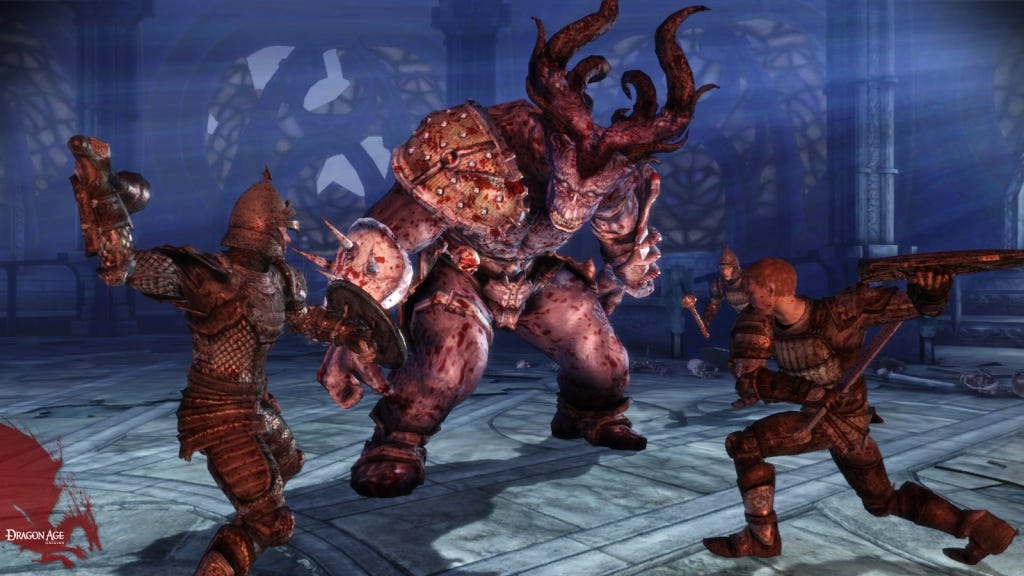Dragon Age, mental health, and that Anders guy
A personal story and a lesson I can never forget.
Trigger warning: sexual violence
When justice is warped, it turns to vengeance, and that is an all-consuming force of destruction that can barely be contained.
This was a lesson I couldn't verbalize until I played Dragon Age II, and the spiraling downfall of Anders. When DA2 was released in 2011, I was two years out from my assault and deep in the throes of trauma. My abuse story is not something I hide, nor is my advocacy for sexual violence survivors, and can easily be found in any Google search.
But in those early days, video games — especially Dragon Age — were my escape into a better world, one where I had blades and magic at my disposal to destroy evil. It would be a few more years for Anders' story to truly penetrate my subconscious, however.
Some backstory: Anders is a complex, complicated, and controversial character. As a mage, he has limited freedom. For the world of Dragon Age, mages are kept in controlled communities and often threatened with severe punishment if there is even a hint that they may cause “trouble.” Anders is passionate about helping the downtrodden people of Kirkwall, the city at the heart of the DA2 storyline. He carries with him a spirit that embodies the concept of Justice. Spirits represent positive aspects, demons represent negative ones.
During the course of the story, he discovers that his best friend, another mage named Karl, was made Tranquil, an inhumane punishment that is the real-world equivalent of a lobotomy. Tranquil mages are shadows of who they once were, unable to dream, unable to use magic, and unable to feel any emotion. Karl being made Tranquil was the final straw in a long list of trauma that Anders had so far endured. The rage Anders feels at this discovery twists Justice into becoming a demon of Vengeance. Later in the story, Anders blows up the Chantry (like a church or cathedral), killing everyone inside while rubble rains down on the rest of Kirkwall from the force of the blast.
As a survivor, I desperately wanted justice. I wanted my rapist to be punished for hurting me and I wanted my college to be punished for not doing a damn thing about it. Justice would restore order and peace to my chaotic life and re-balance the scales.
Time dragged by and I barely managed to graduate college in 2012. I watched all the dreams I'd built up crumble into the ash of my trauma and growing resentment. My attacker escaped justice. My college would, too, when I confronted them in 2018. Every turn seemed to present yet another obstacle as to why nothing could ever happen.
My quest for justice became a thirst for vengeance. Anger became my daily companion, burrowing into my chest only to lash out at the smallest slight. I didn't like who I was anymore but it didn't matter, not when I had vengeance keeping me company.

Sometime in 2015, I was replaying the Dragon Age series, as one does (playing it yet again right now in 2022). I romanced Anders (even though Fenris is the brooding love of my Champion's heart) and his story hit me hard, one chunk of Chantry rubble at a time. When Anders took on the spirit of Justice, he had very real grievances but also very noble intentions; yet by the time he was setting off magical bombs, he couldn't tell the difference between Justice or Vengeance, nor could he control it.
Like Anders, I wasn't in control of my anger or my snarling hunger for vengeance. The line between justice and vengeance is so thin and twists so easily. Unlike Anders, I did not choose the magical bombs route but the one that involved a lot of therapy and self-care.
And it was Anders, of all fictional people, who made me realize that my real-world anger was a poison that hurt only me.
Something I think Bioware forgot is that the special “Bioware magic” never had to do with crunch or deadlines, but their writers and their incredible talent for storytelling and immersion. Dragon Age as an entire series influenced so many people, including myself, but Anders especially proved to have a significant impact on my life and my mental health.
For that, I will always be grateful. Never tell me video games don't matter because I will prove you wrong.
Originally published May 10, 2021 on adelechapline.com. It has been edited and updated for publication on Substack.




